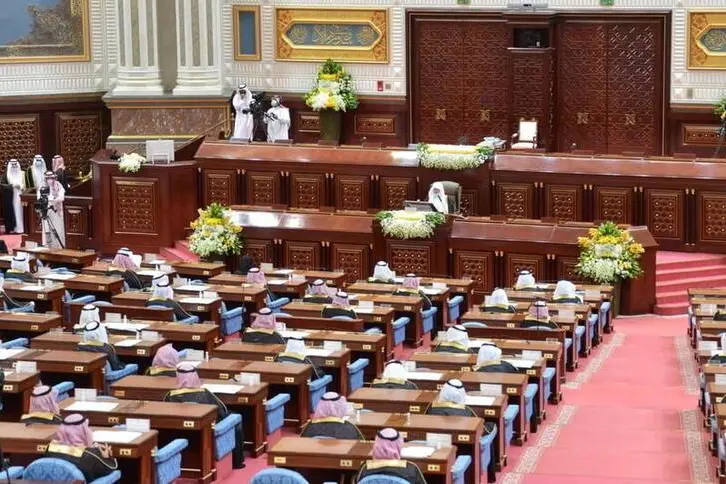PHOTO
RIYADH — Some members of the Saudi Shoura Council have presented to the council the draft Medical Evacuation Law. The draft law, proposed by the Shoura members — Atta Al-Sabti, Dr. Latifa Al-Shaalan, Assaf Abu Thanin, and Ayyub Al-Jarbou — contains several provisions aimed at improving the quality and standard of the medical evacuation sector and make it attractive to investors.
According to the provisions of the law, even a 15 minute delay in the scheduled timing in medical evacuation will be deemed as a serious violation, Okaz/Saudi Gazette has learnt from well informed sources. The draft law set to serve a number of objectives such as developing the quality of medical evacuation sector and achieving standard operation aligning with quality benchmarks, developing national skills and competencies, creating the appropriate climate for fair and effective competition, stimulating the medical evacuation market, providing an attractive environment for investment in this sector, and attracting international companies. Among the goals are also to employ modern technology in carrying out medical evacuation missions.
The draft law applies to all medical evacuation operations inside and outside the Kingdom without prejudice to the sovereignty of countries over their territorial borders. Medical evacuation services will cover both citizens and expatriates alike. Medical evacuation aircraft and their operating crews have the authority to take off and land and use all airports in the Kingdom on a permanent basis and in accordance with specific procedures.
According to the provisions of the law, a license to practice aeromedical evacuation shall be obtained from the General Authority of Civil Aviation (GACA). The service provider may not transfer or assign his license to another person or transfer ownership of the licensed facility, whether by sale, mortgage, or any other way, except after obtaining approval from the competent authority. The service provider may not impose fees or remuneration other than that were approved by the authority responsible for medical evacuation services. Without prejudice to the Competition Law or other regulations, the service provider must obtain the approval of GACA or any other relevant government agencies before undertaking participation or any acquisition or merger that leads to making the service provider dominant within the Saudi market.
The law stipulates mandatory subscription in cooperative insurance against professional and medical risks for all health practitioners involved in medical evacuation. Medical insurance policies include nominal fees for medical evacuation inside and outside the Kingdom, and the competent authority must keep pace with modern technical developments in digital transformation, and create a comprehensive electronic platform that connects with the relevant government digital platforms as a modern means of managing its work.
It is prohibited to use any means of medical evacuation unless it complies with the required specifications and is equipped with a tracking system. Officials working in the places to be inspected, regardless of their location, must enable the inspectors to perform their work and provide all facilities and information and the required documents. In the meantime, inspectors must show their employment cards during the time of inspection.
The following acts will be considered as violation of the draft law: Involve in tampering with any of the property, means, devices, equipment, tools, or vehicles used in medical evacuation or destroying them; using or selling any of the property, or sale or purchase or import or possess without obtaining licenses from the relevant authorities, apart from disclosing data about medical evacuation and using it for purposes other than what it was intended for.
A violation that results in death is considered as a serious violation. Similar is the case with inflicting serious damage, poor service, or providing false and incorrect information that affects the efficiency of the evacuation. A request for a life-saving evacuation for a case that does not require it or rejection for carrying out medical evacuation of a case that was accepted previously, giving incorrect medical information about the condition of the patient to be transferred from the hospital, and the late arrival of air ambulance for more than 15 minutes from the time of the plane’s arrival and landing are among the violations.
The draft law also stipulated that the service provider is not responsible for failure or negligence in the performance of the entities benefiting from the service. The entity from or to which the sick, injured, or other person is transferred shall bear responsibility for any damage that occurs as a result of non-compliance with the provisions of the law. Anyone who violates the provisions of the law, regulation, license or registration will be served with a warning or slapped with fine. They will also be prevented from renewing the license for a period not exceeding three years, apart from suspension of registration or prevention from renewing it for a period not exceeding three years, stopping the service in question and canceling the registration.
The service provider would issue an internal regulation that includes a schedule of violations and penalties. These include salary cuts, designating additional shifts, stopping qualification courses, temporary suspension from flying, suspension for a full course, suspension from work, directing the pilot to be demoted or transferred to another plane, recommending that the pilot’s contract be transferred from pilot to co-pilot and recommending dismissal.
There are also provisions in the law for the punitive measures to be taken against the air ambulance crew in the event of committing any violations. The violations include reporting late by 15 minutes or less of the flight time; canceling flights for incorrect technical or medical reasons; mistreatment of other crew members or any of the workers in any facility; coming late for the flight attendance by more than 15 minutes; failure in completing the administrative procedures for which he is responsible before or after the flight; losing or forgetting any of his essential documents to complete the trip; and disobeying to undergo tests for alcohol or drugs or show a positive test result. The violations also include negligence in performing tasks and duties causing material damage, or an impact on the performance of the trip, delaying the transfer of patients or canceling the trip, failure to report or covering up operational, medical, or administrative errors that may affect employees, operations, and patient safety.
© Copyright 2022 The Saudi Gazette. All Rights Reserved. Provided by SyndiGate Media Inc. (Syndigate.info).





















